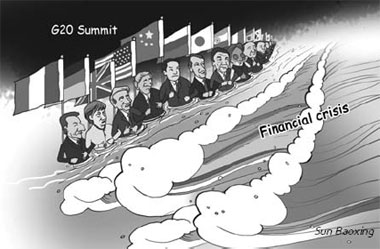
|
BIZCHINA> Analysis and Opinions
 |
|
G20 leaders lay out rescue plan
(China Daily)
Updated: 2008-11-18 11:43 The financial summit of the leaders of the Group of 20 major industrialized and developing economies, including Japan, China, India, the United States, several European nations as well as the European Union, ended in Washington on Saturday after adopting a declaration and a plan of action to tackle the ongoing financial turmoil. Talks that include only the major industrialized countries will never conquer the global financial crisis. The two-day meeting was historically significant in that leaders from emerging countries also took part in discussions.
 The focus of attention at the meeting was whether the leaders could present a clear course of action to curb the excesses of US-style laissez-faire free-market capitalism and build a new order for the global financial system. The leaders there managed to come together and eventually announced to the world their plans to overcome the current ordeal.
The declaration sets out principles to promote financial market reform and also stipulates steps to be taken, including reform of the International Monetary Fund and fiscal stimulus measures. It is worth noting that the action plan comprises both measures to be implemented by the end of March and tasks to address longer-term goals. The G20 plan adopts a two-track approach in which it places high priority on halting the spread of the immediate crisis but also deals with longer-term themes. The leaders will be tested on whether their resolve at the summit is true through their future actions. It is also worth noting that the G20 leaders stressed fiscal stimulus measures among those to be taken in the short term. Although Japanese, European and US central banks carried out coordinated interest rate cuts, there is now less room to maneuver in terms of further use of financial policies to alleviate the crisis. Given the circumstances, Japan, Europe and the United States mapped out measures to turn around the global economy, and China, for its part, also decided to implement large-scale economic stimulus measures just before the summit. However, the leaders at the G20 meeting all recognized the importance of taking further fiscal measures to prevent the global economy from sinking even further and a worsening of the simultaneous recession. Japan, which apparently has entered a recession, decided to move ahead with an additional stimulus package, but there is a possibility that the country may be pressed to implement further measures. Although the participating countries agreed in principle on strengthening the functions of the International Monetary Fund (IMF)'s and financial market reform, they had to postpone drafting universal concrete measures. This is because the interests of countries differ widely and therefore further arrangements need to be made. As for the IMF's capital reinforcement, Japan's proposal served to sew up discussions. Japan proposed doubling capital contributions by all IMF member countries from the current total of $320 billion, and outlined its plan to lend up to $100 billion to the financial watchdog. Together with the World Bank, the IMF is a central body under the Bretton Woods system, which built a global economic order after World War II. Its operation has long been dominated by the United States and Europe. However, demands have been increasing for emerging countries with growing economic power to have a greater voice. The question is how the capital contribution ratio among the IMF member countries and the organization itself should be reviewed to solve this kind of issue and bolster its function. Discussions to create a so-called "Bretton Woods II" will be difficult. Meanwhile, the summit did little to address the dollar-centered currency system, which has supported the postwar global economic system. France and some other countries insist on a significant overhaul of the system, while the United States is backing a strong dollar and calling for maintaining the status quo. This will definitely be an issue in future discussions. With regard to financial market reform, the declaration emphasizes sound regulation and incorporates strengthening regulations and oversight over international financial institutions, complex financial products sold worldwide and credit rating agencies. It also specifically calls for international cooperation in financial supervision. These are all sensible measures to prevent the recurrence of a financial crisis. However, there is still a gap between Europe, which calls for stricter regulations and oversight, and the United States, which takes a cautious stance on the matter. It seems that it will take time for sound regulation to take shape. Uncertainty has grown surrounding the current condition of the US economy that is the epicenter of the global financial crisis. A fall in stock prices and an increase in unemployment have triggered a reduction in consumer spending, an area that served as a driving force of economic growth. In addition, a downward trend in housing prices - the root of the subprime mortgage meltdown - continues. Until prices bottom out, financial institutions' losses will continue to swell and the global financial crisis will not end. With that, the real economy will further worsen, and it is feared to fall into a vicious cycle of triggering another financial crisis. In a speech ahead of the G20 summit meeting, US President-elect Barack Obama asked the US government to rapidly implement additional economic stimulus measures. In contrast to the administration of US President George W. Bush, Obama has taken a protectionist stance. However, promoting free trade is vital to activate the world economy and to accelerate its growth. It is highly likely that Obama may be pressed to modify his vision sooner or later. After taking office and launching the new administration on Jan 20, the policies Obama sets in motion will be the main focus of the next summit meeting. The Yomiuri Shimbun/Asia News Network (For more biz stories, please visit Industries)
|